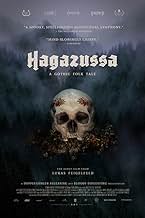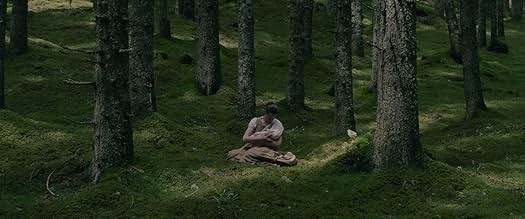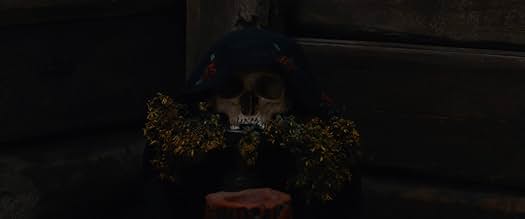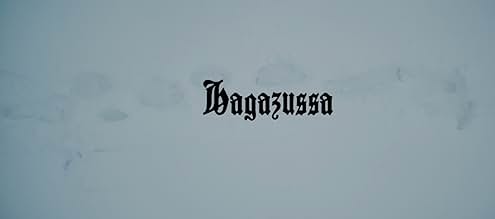IMDb-BEWERTUNG
5,8/10
7931
IHRE BEWERTUNG
Paranoia & Aberglaube im Europa des 15. Jahrhunderts.Paranoia & Aberglaube im Europa des 15. Jahrhunderts.Paranoia & Aberglaube im Europa des 15. Jahrhunderts.
- Regie
- Drehbuch
- Hauptbesetzung
- Auszeichnungen
- 5 Gewinne & 9 Nominierungen insgesamt
Tanja Petrovsky
- Swinda
- (as Tanja Petrovskij)
Killian Abeltshauser
- Farmer
- (as Kilian Abeltshauser)
Empfohlene Bewertungen
Hagazussa is a film rightly compared to its contemporary in "The Witch" and it undoubtedly suffers for it.
Where The Witch laid out a basic narrative structure and sowed the seeds of malevolence in far more obvious terms, it did not lose its impact or atmosphere during the slower burning scenes. In fact, they served to highlight the ever growing sense of dread - allowing the mind to wander into dark possibilities without ever losing sense of itself.
Hagazussa approaches a similar theme - superstitions, isolation and how misconceptions about the natural world played into daily life during the 16th century, but delivers far less in terms of narrative.
This is more a trip through the life of an outcast Mother & Daughter and we the audience are left to piece together the elements one by one as events unfold.
For me the main question posed by the movie was whether Albrun was indeed going mad or whether she was a witch.
While there is a glaring lack of dialogue that would help to flesh out some of the themes pushed forward (the interactions with Nature, impacts of disease etc) there are enough clues in the imagery to understand that Albrun is undergoing a transformation of some kind, whether it be the loss of her own sanity or something more supernatural.
The presence of the plague and its impact on both Albrun and the local villagers are a catalyst for the films major plot points, as is the intense isolation and persecution of Albrun and its influence over her mental state.
Due to the space in between each element coming together, it is difficult to maintain focus as a viewer and I found myself distracted by my own mind wandering...asking myself if there was something I was missing.
There is a movie worth watching somewhere in here, but it is buried so deep under a pile of long takes and ambiguity, that many will simply look for answers in a different film altogether.
Where The Witch laid out a basic narrative structure and sowed the seeds of malevolence in far more obvious terms, it did not lose its impact or atmosphere during the slower burning scenes. In fact, they served to highlight the ever growing sense of dread - allowing the mind to wander into dark possibilities without ever losing sense of itself.
Hagazussa approaches a similar theme - superstitions, isolation and how misconceptions about the natural world played into daily life during the 16th century, but delivers far less in terms of narrative.
This is more a trip through the life of an outcast Mother & Daughter and we the audience are left to piece together the elements one by one as events unfold.
For me the main question posed by the movie was whether Albrun was indeed going mad or whether she was a witch.
While there is a glaring lack of dialogue that would help to flesh out some of the themes pushed forward (the interactions with Nature, impacts of disease etc) there are enough clues in the imagery to understand that Albrun is undergoing a transformation of some kind, whether it be the loss of her own sanity or something more supernatural.
The presence of the plague and its impact on both Albrun and the local villagers are a catalyst for the films major plot points, as is the intense isolation and persecution of Albrun and its influence over her mental state.
Due to the space in between each element coming together, it is difficult to maintain focus as a viewer and I found myself distracted by my own mind wandering...asking myself if there was something I was missing.
There is a movie worth watching somewhere in here, but it is buried so deep under a pile of long takes and ambiguity, that many will simply look for answers in a different film altogether.
The slowest of slow burns that surely has no trouble whatsoever in setting up an atmosphere that reeks of dread & terror yet doesn't really know what to do with it, Lukas Feigelfeld's directorial debut landed on my radar due to its comparisons to The VVitch and though the two films are stylistically similar, everything about Hagazussa is vastly inferior to Robert Eggers' diabolical masterpiece.
Despite a foreboding aura pervading the frames at all times and additional boost provided by its remote setting, cold palette, methodical camerawork & menacing soundtrack, this is horror on a standstill, for the plot goes nowhere nor does it do something productive with the impressive set up, and features the same episodes repeated throughout its runtime which become frustrating after a while.
Its 102 minutes runtime is paced so glacially that the film feels twice as long. It's too slow, too silent & too obtuse for its own good. The suspense it creates is nail-biting but it's got nothing to follow it up with and ratchet things up even further. Aleksandra Kwen aptly renders her character's struggle to preserve her sanity but her contribution doesn't amount for much in the end, just like its tense ambience.
Slower than your usual slow-burn narratives and never for once taking advantage of its ominous vibe, Hagazussa is a splendidly photographed & finely acted horror that keeps hinting at a nightmare that's waiting to unfold but never actually does. A dull, dreary & dreadful cinema that doesn't hold a candle to the perfection that is The VVitch, this German folktale is one of the most boring & unrewarding films of the year.
Despite a foreboding aura pervading the frames at all times and additional boost provided by its remote setting, cold palette, methodical camerawork & menacing soundtrack, this is horror on a standstill, for the plot goes nowhere nor does it do something productive with the impressive set up, and features the same episodes repeated throughout its runtime which become frustrating after a while.
Its 102 minutes runtime is paced so glacially that the film feels twice as long. It's too slow, too silent & too obtuse for its own good. The suspense it creates is nail-biting but it's got nothing to follow it up with and ratchet things up even further. Aleksandra Kwen aptly renders her character's struggle to preserve her sanity but her contribution doesn't amount for much in the end, just like its tense ambience.
Slower than your usual slow-burn narratives and never for once taking advantage of its ominous vibe, Hagazussa is a splendidly photographed & finely acted horror that keeps hinting at a nightmare that's waiting to unfold but never actually does. A dull, dreary & dreadful cinema that doesn't hold a candle to the perfection that is The VVitch, this German folktale is one of the most boring & unrewarding films of the year.
About half an hour into the film it gives up to tell a story and becomes a picture album. I've read the film took 4 years to make with a one year brake in-between. Makes you wonder if you have just seen the intermediate state where they took all the filmed material they had so far, strung it together for the sole purpose of achieving a length of circa a 100 minutes and call it a finished movie.
Folk horror subgenre is close to my heart, and so I finally had to check this German/Austrian nightmare. It's certainly a divisive one. The ever-raging battle of relationship between style and substance among film fans continues here, too, and I seem to land in the middle. I believe director Lukas Feigelfeld, to whom this is film school graduation project, intended a trip. Very gloomy, meditative, earthly trip.
The film contains only a few lines of dialogue. The plot is barely even there, as the movie, in every minute of it, thrives on atmosphere and feelings. The main character doesn't reason much, or scheme, or rationalize, the "plot", or rather mood is driven by mere feelings of hers. Heavy feelings, building an atmosphere that almost tires you. The pacing is much slower than your typical described slow-burner, and the movie demands some sinking into for it to execute its intentions. It's almost like a film equivalent of a gothic painting, a mural that you have to consume with long attention to all detail. The cinematography is beautiful, locations isolated, mossy, almost ancient-like.
A patient man's film, and indeed one for those who appreciate strong on emphasis style, and unspoken moods. On a side note, I had noticed plenty of people put "Hagazussa" against "The VVitch" with the latter coming in second, and with that I, in good conscience, have to disagree. 6/10.
The film contains only a few lines of dialogue. The plot is barely even there, as the movie, in every minute of it, thrives on atmosphere and feelings. The main character doesn't reason much, or scheme, or rationalize, the "plot", or rather mood is driven by mere feelings of hers. Heavy feelings, building an atmosphere that almost tires you. The pacing is much slower than your typical described slow-burner, and the movie demands some sinking into for it to execute its intentions. It's almost like a film equivalent of a gothic painting, a mural that you have to consume with long attention to all detail. The cinematography is beautiful, locations isolated, mossy, almost ancient-like.
A patient man's film, and indeed one for those who appreciate strong on emphasis style, and unspoken moods. On a side note, I had noticed plenty of people put "Hagazussa" against "The VVitch" with the latter coming in second, and with that I, in good conscience, have to disagree. 6/10.
What a trip. It's tough to judge or rate movies like this. I can see how some will cherish this as masterpiece, while the majority will just be annoyed and think this is one of the worst things they've watched. It's a very fine line and I'm not entirely sure it is being walked on with grace or subtlety for that matter.
It's in black and white and it's mysterious to say the least. You have cryptic messages and you have characters (re)acting very weird. It is supposed to leave almost everything open to interpretation, it is also supposed to scare you at times. Also if it matters to you, one way or the other, the movie has nudity in it. Not in an exciting way mind you, and also there is psychological and some physical violence in it too. And it also messes with your mind ... maybe you can make sense of it, maybe you'll watch it again, to discover new things ... or maybe you will just shut it off after a couple of minutes ...
It's in black and white and it's mysterious to say the least. You have cryptic messages and you have characters (re)acting very weird. It is supposed to leave almost everything open to interpretation, it is also supposed to scare you at times. Also if it matters to you, one way or the other, the movie has nudity in it. Not in an exciting way mind you, and also there is psychological and some physical violence in it too. And it also messes with your mind ... maybe you can make sense of it, maybe you'll watch it again, to discover new things ... or maybe you will just shut it off after a couple of minutes ...
Wusstest du schon
- WissenswertesGraduation film of director Lukas Feigelfeld.
- VerbindungenFeatured in Woodlands Dark and Days Bewitched: A History of Folk Horror (2021)
Top-Auswahl
Melde dich zum Bewerten an und greife auf die Watchlist für personalisierte Empfehlungen zu.
- How long is Hagazussa?Powered by Alexa
Details
Box Office
- Bruttoertrag in den USA und Kanada
- 13.253 $
- Eröffnungswochenende in den USA und in Kanada
- 6.041 $
- 21. Apr. 2019
- Weltweiter Bruttoertrag
- 21.487 $
- Laufzeit
- 1 Std. 42 Min.(102 min)
- Farbe
- Seitenverhältnis
- 2.39:1
Zu dieser Seite beitragen
Bearbeitung vorschlagen oder fehlenden Inhalt hinzufügen










